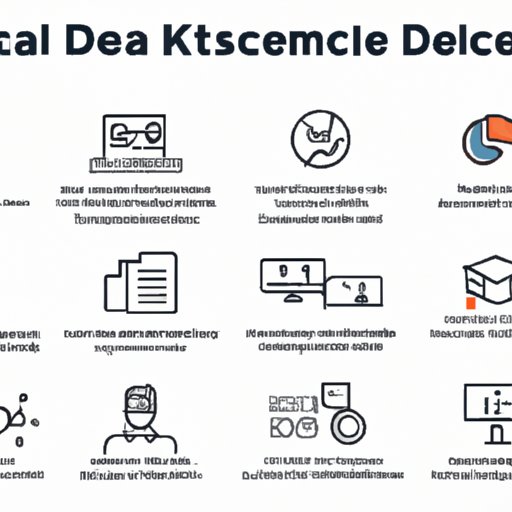Introduction
Data science is a rapidly growing field that integrates mathematics, statistics, computer science, and domain knowledge to extract insights from large datasets. With the rise in digital technology, more organizations are turning to data science to better understand customer behavior, develop effective marketing strategies, and identify areas of improvement. As a result, there is an increased demand for individuals with a data science degree.
In this article, we will discuss what a data science degree is, the different types of data science degrees available, the prerequisites for obtaining a data science degree, how to find mentors and advisors, the benefits of attending a data science bootcamp, how to network with other data scientists, and tips for creating a portfolio of data science projects.
Overview of What a Data Science Degree Is
A data science degree is an interdisciplinary program that combines mathematics, statistics, computer science, and domain knowledge to analyze and interpret data. The degree typically involves courses in data analysis, machine learning, artificial intelligence, predictive analytics, and visualization. It also covers topics such as data engineering, database management, natural language processing, and business intelligence. With a data science degree, graduates can pursue careers in fields such as healthcare, finance, marketing, retail, and government.
Benefits of Obtaining a Data Science Degree
Obtaining a data science degree offers numerous benefits. According to a study by Burning Glass Technologies, “the number of job postings requiring a data science degree has grown nearly three times faster than postings for all other occupations.” 1 This indicates that employers are increasingly looking for candidates with a data science degree.
Furthermore, having a data science degree can open up opportunities to work in various industries, such as healthcare, finance, and marketing. Additionally, it can provide you with the skills necessary to become a successful data scientist, such as data analysis, machine learning, and predictive analytics. Finally, having a data science degree can help you stay ahead of the curve in an ever-evolving field.

Types of Data Science Degrees
There are several types of data science degrees available at universities and colleges. These include Bachelor of Science (BS) in Data Science, Master of Science (MS) in Data Science, Doctor of Philosophy (PhD) in Data Science, and Graduate Certificate in Data Science. Each of these programs has its own curriculum, so it is important to research the different programs before making a decision.

Considerations for Selecting the Right Program
When selecting a data science degree program, there are several factors to consider. First, look at the curriculum of the program to ensure that it covers the topics necessary to become a successful data scientist. Second, consider the cost of the program, including tuition, fees, and living expenses. Third, review the faculty of the program to make sure they have the experience and expertise necessary to teach the subject matter. Finally, consider the location of the school to determine if it is close enough for you to attend classes or if you need to take online courses.
Prerequisites for a Data Science Degree
In order to enroll in a data science degree program, most universities and colleges require students to complete certain prerequisites. These prerequisites may include courses in mathematics, statistics, computer science, and domain knowledge. Additionally, some schools require students to submit standardized test scores, such as the GRE or GMAT.
To prepare for the prerequisites, it is important to create a plan and set realistic goals. Utilizing online resources such as webinars and tutorials can be a great way to learn the material. Additionally, many universities offer free online courses that can help you get up to speed on the topics.
Identifying Potential Mentors & Advisors
Having a mentor or advisor can be an invaluable resource when pursuing a data science degree. Mentors and advisors can provide valuable advice and guidance on topics such as selecting the right program, preparing for exams, and navigating the job market.
There are several strategies for finding potential mentors and advisors. One way is to reach out to your network, such as family, friends, and colleagues. You can also search online for people who have experience in the field. Additionally, many universities and colleges have career centers that can help connect you with potential mentors and advisors.
Enrolling in a Data Science Bootcamp
Attending a data science bootcamp can be a great way to gain hands-on experience and learn the skills necessary to become a successful data scientist. A typical bootcamp includes lectures, workshops, and projects that cover topics such as data analysis, machine learning, and predictive analytics. Additionally, many bootcamps provide mentorship and job placement assistance.
The benefits of attending a bootcamp include gaining a deeper understanding of the subject matter, developing practical skills, and building a network of peers and professionals. Furthermore, many bootcamps offer job placement assistance, which can be beneficial for those looking for employment after graduation.

Networking with Other Data Scientists
Networking with other data scientists can be a great way to learn more about the field and stay up to date on the latest trends. Attending professional conferences, joining online communities, and following industry leaders on social media are all great ways to expand your network. Additionally, connecting with other data scientists on LinkedIn can help you build relationships and stay informed on new job opportunities.
Some of the benefits of networking include gaining knowledge, staying up to date on industry trends, and opening up new opportunities. Additionally, networking can help you build relationships with potential mentors and advisors, which can be beneficial for your career.

Developing a Portfolio of Data Science Projects
Having a portfolio of data science projects is an essential part of becoming a successful data scientist. A portfolio provides evidence of your skills and accomplishments and demonstrates your ability to solve problems. It also shows potential employers that you are capable of handling real-world scenarios.
When creating a portfolio, it is important to choose projects that showcase your skills and demonstrate your understanding of the concepts. Additionally, it is important to include a description of each project to explain your approach and provide context. Finally, you should be prepared to discuss each project in detail during interviews.
Conclusion
In conclusion, obtaining a data science degree can open up numerous opportunities and provide you with the skills necessary to become a successful data scientist. When selecting a data science degree program, it is important to consider the curriculum, cost, faculty, and location. Additionally, it is important to complete the necessary prerequisites, find mentors and advisors, attend a bootcamp, network with other data scientists, and create a portfolio of data science projects.
With hard work and dedication, you can achieve your goal of obtaining a data science degree. Remember to take advantage of the resources available to you and don’t be afraid to ask for help when you need it.
(Note: Is this article not meeting your expectations? Do you have knowledge or insights to share? Unlock new opportunities and expand your reach by joining our authors team. Click Registration to join us and share your expertise with our readers.)
